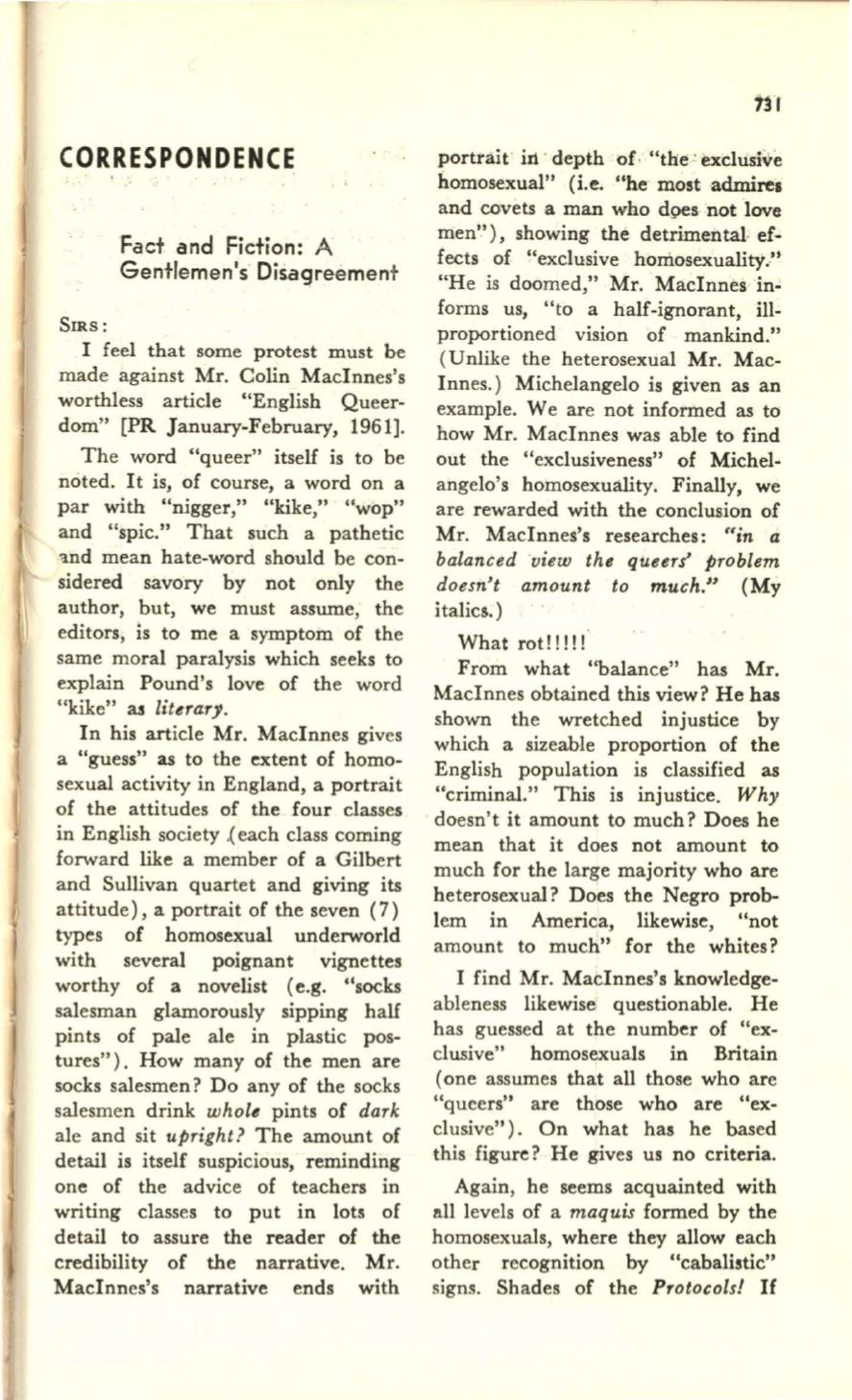
CORRESPONDENCE
SIRS:
Fact and Fiction: A
Gentlemen's Disagreement
I
feel that some protest must be
made against Mr. Colin MacInnes's
worthless article "English Queer–
dom" CPR January-February, 1961].
The word "queer" itself is to be
noted. It is, of course, a word on a
par with "nigger," "kike," "wop"
and "spic." That such a pathetic
-and mean hate-word should be con–
sidered savory by not only the
author, but, we must assume, the
editors, is to me a symptom of the
same moral paralysis which seeks to
explain Pound's love of the word
"kike" as
literary.
In his article Mr. MacInnes gives
a "guess" as to the extent of homo–
sexual activity in England, a portrait
of the attitudes of the four classes
in English society .(each class coming
forward like a member of a Gilbert
and Sullivan quartet and giving its
attitude) , a portrait of the seven (7)
types of homosexual underworld
with several poignant vignettes
worthy of a novelist (e.g. "socks
salesman glamorously sipping half
pints of pale ale in plastic pos–
tures"). How many of the men are
socks salesmen? Do any of the socks
salesmen drink
whole
pints of
dark
ale and sit
upright?
The amount of
detail is itself suspicious, reminding
one of the advice of teachers in
writing classes to put in lots of
detail to assure the reader of the
credibility of the narrative. Mr.
MacInnes's narrative ends with
1~1
portrait irt · depth of. "the : exclusi*e
homosexual" (i.e. "he most ·admire.
and covets
a
man who d9fs not lovel
men"), showing the detrimental. ef–
fects of "exclusive homosexuality.."
"He is doomed," Mr. MacInnes in–
forms us, "to a half-ignorant, ill–
proportioned vision of mankind."
(Unlike the heterosexual Mr. Mac–
Innes.) Michelangelo is given as an
example. Weare not informed as to
how Mr. MacInnes was able to find
out the "exclusiveness" of Michel–
angelo's homosexuality. Finally, we
are rewarded with the conclusion of
Mr. MacInnes's researches:
"in a
balanced ·view the queers' problem
doesn't amount to much."
(My
italics. )
What rot!!! I!
From what ''balance'' has Mr.
MacInnes obtained this view? He has
shown the wretched injustice by
which a sizeable proportion of the
English population is classified as
"criminal." This is injustice.
Why
doesn't it amount to much? Does he
mean that it does not amount to
much for the large majority who are
heterosexual? Does the Negro prob–
lem in America, likewise, "not
amount to much" for the whites?
I find Mr. MacInnes's knowledge–
ableness likewise questionable. He
has guessed at the number of "ex–
clusive" homosexuals in Britain
(one assumes that all those who are
"queers" are those who are "ex–
clusive") . On what has he based
this figure? He gives us no criteria.
Again, he seems acquainted with
all levels of a
maquis
formed by the
homosexuals, where they allow each
other recogmtlOn by "cabalistic"
signs. Shades of the
Protocols!
If


